- Home
- Christine Pope
Demons & Djinn: Nine Paranormal Romance and Urban Fantasy Novels Featuring Demons, Djinn, and other Bad Boys of the Underworld Page 17
Demons & Djinn: Nine Paranormal Romance and Urban Fantasy Novels Featuring Demons, Djinn, and other Bad Boys of the Underworld Read online
Page 17
The dog had definitely latched on to Jace. Maybe she’d been more bonded with Mr. Munoz, back in Albuquerque. Or maybe Jace was one of those people whom dogs tended to love. I didn’t know, and in the end, it didn’t matter. Jace was Dutchie’s new best friend. It didn’t bother me as much as I thought it might have, simply because Dutchie had proved herself to be a decent judge of character. If she liked Jace, it must mean he was okay.
It was dark by the time dinner was ready. Jace and I carried the various platters and bowls to the dining room table, and I brought out some matches I’d found in the kitchen so I could light the pillars in their wrought-iron holder. Without my asking, Jace turned off the overhead fixture, so all we had was the candlelight. It danced off the heavy glass goblets, the dark bottle of cabernet that sat waiting to be drunk. The walls in this room were a warm parchment yellow, and seemed to reflect the glow of the candles and multiply it.
“Wow,” Jace murmured. “I hadn’t expected to see anything like this ever again.” Then he shook his head. “Wait — I don’t think I’d ever seen anything like this before, either. It looks beautiful, Jessica.”
“Thanks,” I said, my tone almost shy. Now that I was with him in this intimate space, would he take all this for more than I had intended, as some sort of seduction or something?
Well, there wasn’t anything I could do about it now. I pulled out my chair — obscurely glad that he hadn’t offered to do it for me — and sat down. A second later, he followed suit, lifting the cloth napkin I’d set out and placing it in his lap. Then he raised the bottle of wine, which he’d already opened back in the kitchen, and poured some of the cabernet into my glass first, and then his.
“I think we should have a toast,” he said.
“What should we toast to?” Not being dead seemed the obvious choice, but it seemed crass to voice the thought aloud.
He seemed to think about it for a moment, his glass a few inches off the tabletop. The candlelight gleamed against his raven-dark hair, and again I wondered what it would feel like to run my fingers through it.
“To sanctuary,” he said at last.
I was definitely on board with that. Even if nothing ever happened between Jace and me, we had found a quiet haven here, a place to shelter from whatever might be going on outside in the world. “To sanctuary,” I echoed, raising my glass as well and clinking it against his.
A brief silence fell as we both swallowed some of the wine. It wasn’t as heavy as the Montepulciano I’d drunk a few days earlier. I could taste the fruit in it, and thought it was probably a good choice to go along with the sharpness of the mustard sauce I’d made for the rabbit.
Then we both dug into the main dish, which turned out to be excellent. I wasn’t sure why I’d avoided rabbit before this, because I found myself liking the taste.
Good thing, too, I thought, because you’re probably going to be eating a lot of it in the future.
And the mashed potatoes actually were fine, even with the evaporated milk, and there was fresh bread and butter and roasted carrots. It really was quite the feast, especially considering I’d had to work with what was available in the cellar and the greenhouse. No more popping down to the grocery store to get that one special ingredient.
“This is…amazing,” Jace finally said, after making some serious inroads into the food on his plate. “Were you a chef or something?”
“Hardly.” I took a sip of wine to cover my embarrassment, cheeks flaming. I really needed to get this blushing thing under control one way or another. “My mother taught me how to cook. That is, she pointed out that it was mostly following directions, at least for the basic stuff. So…that’s what I did tonight. Followed directions.”
“It’s still pretty incredible.” Expression thoughtful, he drank some of his own wine. “So what did you do? Before, I mean.”
“I was getting my master’s at UNM, so I T.A.’d a couple of courses. English — a lot of paper grading, mostly.” I broke off a piece of bread but didn’t eat it, just sort of rolled it between my finger and thumb. “What about you?”
“I graduated from UNM four years ago, then came back to Taos.” He looked at me directly then, as if studying my features, and it was difficult to remain as I was, to not glance away. “We must have been there at the same time, but I guess there wouldn’t have been much overlap. You’d have been a freshman when I was a senior.”
I could have sworn his expression was somewhat regretful, but I didn’t want to read too much into it. That way only lay disappointment.
“Anyway,” he went on, “after that I went back to Taos. I conducted tours at the pueblo part of the time, and the rest of the time I worked on getting my business going.”
“What kind of business?” I asked, after finally remembering to eat the piece of bread I was holding.
“Website and graphic design. I did some work for the local businesses. Mostly advertising stuff. The tours paid a lot better.”
That revelation surprised me. “They did?”
“Oh, yeah.” He got himself a piece of bread, then buttered it. When he went on, he wore a rather sardonic smile. “You’d be amazed how much the tourists were willing to part with. On a good day, I could make around three hundred bucks. White guilt is expensive, I guess.”
I just stared at him, and he hurried to say,
“No offense. But I think that’s part of why they’re willing to hand over a twenty — or more — for a half-hour tour of the pueblo.” His gaze sharpened on me, and again I had to force myself to look back at him directly. “Anyway, I’d say to look at you, you must have some First Nations blood back in the woodpile yourself. Or am I overreaching?”
So that was it — he was just inspecting my appearance in an attempt to determine my own origins. Fair enough. Would he feel better, knowing I had a Native American heritage of my own? “No, you’re not overreaching,” I replied, glad I sounded calm and unruffled. “Family legend has it that my great-great-great-grandmother was full-blood Ute.”
“Even better,” Jace said, a certain warmth in his eyes doing unexpected things to my midsection. “The Ute and the Pueblo were on very good terms back in the day.”
What in the world was I supposed to say to that? Was Jace hoping that he and I would be, as he put it, “on very good terms”? Not that I thought I would be opposed to such a shift in our relationship, but we’d only known each other for a couple of days. I certainly didn’t intend to rush into anything.
“Well, that’s good to know,” I remarked. “At least I won’t have to worry about tribal warfare breaking out in the laundry room or something.”
For a second or two, he didn’t reply, only stared at me, and I hoped I hadn’t offended him. But then he chuckled, reached for the wine bottle, and poured some more into my glass. Still smiling, he said, “No, I don’t think we have to worry about any conflict here.”
It was all I could do not to shiver. No matter what he said, though, I wouldn’t take for granted this current harmony and goodwill lasting indefinitely.
How could it, when we were such strangers to one another?
Chapter 12
But somehow, strangely, that cooperation did continue. We fell into a sort of pattern after a few days — rising early, eating breakfast, which was toast or oatmeal most of the time, taking turns with our showers, getting dressed, then doing whatever needed to be done around the place. Jace was full of plans, abetted by some of the books and manuals he found in the office.
“We really should build a henhouse,” he said one morning, about a week after he showed up. “I know people in the area had to have kept chickens. Eggs are a good, steady source of protein.”
“So are rabbits,” I replied, not bothering to point out that we’d been eating rabbit at least every other day. Wile E. Coyote would have been jealous.
“Now they are,” he said. “In the dead of winter, it might be more difficult. But those plans I found for a henhouse look dead easy. We just need to get som
e supplies.”
“What, you’re a carpenter and a web designer?” I asked, teasing. Sort of. What I knew about building henhouses was roughly the same as what I knew about brain surgery — that is, nothing. I didn’t think I was going to be much help.
He shrugged. “I picked up a few things here and there. It’ll be fine.”
And so, later that morning, we headed down into Santa Fe in search of a Home Depot, which wasn’t as easy as it might seem, considering we couldn’t exactly Google its location. But we found a yellow pages inside an abandoned dentist’s office, and tracked down the store from there. It was a good ways outside the city center, so I was doubly glad that we’d looked it up instead of driving aimlessly all over the place.
Jace had a list of everything he needed, and we “liberated” one of the trailers you used to be able to rent to haul your building supplies home. Thank God my father had invested in a tow package for the Cherokee, even though we’d never actually had any reason to use it. There just never seemed to be quite enough in the family budget to buy a trailer or an ATV.
It took a while to locate and then load all the necessary supplies — partly because we both kept finding things we thought would be useful and figured we might as well add them to the haul. But after the back of the SUV was packed to the rafters, and the trailer similarly loaded down, we drove off, moving slowly through the streets, since I had to keep zigging and zagging to avoid abandoned cars and trucks. We’d left Dutchie at home, much to her dismay, since we’d known we would need all the available cargo space in the Cherokee.
“It’s kind of strange, don’t you think?” I asked Jace after we’d cut back up on Cerrillo and were heading to Alameda.
“What’s strange?” he replied, his attention still on the list he held. Maybe he was worried that we’d forgotten something.
“That we haven’t seen anybody. I mean, even with a 99.8% mortality rate, there should still be a couple hundred people wandering around Santa Fe, right? Where are they?”
He did look up at that question, his gaze drifting to the empty sidewalks and dark windows of the businesses on either side of the street. “Lying low?”
“Maybe,” I said, but I wasn’t sure I believed it. By that point, it had been almost a month since the Heat first began to spread across the country. Anyone who was going to die was long dead. You’d think the survivors would be out foraging in earnest, getting ready for winter. “It’s just weird that we haven’t seen a single person.”
“Do you want to find more people?” His tone was almost sharp as he asked that question, as if he thought I wasn’t satisfied with his company, that I needed something more.
“I don’t know,” I replied. It was only the truth. Part of me wanted to know what had happened to everyone, but after my experiences in Albuquerque, I wasn’t sure being around other people was such a good thing. Yes, Jace had turned out to be all right — more than all right, really — but could I count on being that lucky a second time?
“They could be hiding,” he said, his tone thoughtful. “Or gone to Albuquerque, thinking that maybe if any center of government still existed, it would be there, in a place where there would be more survivors. There are probably a lot of reasons why we’re not seeing anybody.”
That explanation sounded logical enough. If it hadn’t been for the voice urging me to get out, would I have left my hometown, or would I have stayed there in the hope that people might gather in what had been the state’s most populous area?
I wouldn’t second-guess myself, not now. I really didn’t know. Then again, my run-ins with Chris Bowman and the man outside Walgreens might have been enough to convince me that it was time to get out of Dodge.
“You’re right, of course,” I said, and he smiled.
“It’s okay, Jess. We’re okay. That’s all we have to worry about right now.”
Oh, how I wanted to believe him. I just wasn’t sure if I did.
The henhouse did go together with surprising speed, and within three days’ time, we had a full-on chicken coop with space for six hens to nest, a perch that Jace built from a closet rod, and an enclosed run. He also hung a light overhead so the hens would be encouraged to lay even on gray winter days. It was all perfect, except…no chickens.
So we got in the Cherokee again, this time taking Dutchie with us, and started scouring the rural and semi-rural areas outside Santa Fe for any rogue chickens who needed a home. It actually didn’t take as long as I’d thought; about an hour into our search, we found a house with a flock of chickens scratching away happily in the backyard, apparently unaware that the apocalypse had happened and they’d been left on their own. We gathered up six hens and the rooster, who was less than pleased at being plucked out of his yard and put in the back of an SUV. Jace was a little scratched up by the time the procedure was over, but in the end we had everything we needed. All I could say was that I was very glad I’d had the forethought to lay down some plastic trash bags in the bed of the SUV before dumping the chickens back there. If he’d had a proper grave, my father would have been rolling over in it.
It took a few days for the chickens to settle down and start laying, but after that we were able to have eggs pretty much every morning.
“Next, the goats,” Jace said at dinner not too long after that.
“Are you still on that kick?” I asked. All right, I had to say that the whole chicken thing was working out pretty well. But the thought of having goats roaming around the property intimidated me more than I wanted to admit. When I was a little kid, maybe five or six, my parents had taken me to a petting zoo. All had gone well until one of the goats decided to eat part of my sweater. I’d screamed bloody murder, and my father had grimly lifted me out of the pen and carried me away. Needless to say, goats weren’t exactly my favorite animals.
“Yes, I’m still on that kick. We ate the last of the cheese two days ago.” His dark eyes caught mine, and he grinned at me, a wicked grin I’d come to know over the past few weeks…and one that invariably made my knees go a little wobbly. So far I didn’t think Jace had noticed what kind of an effect it had on me, but still, I couldn’t help getting annoyed with myself for not having better self-control. He clasped his hands together and said in mock-earnest tones, “Jessica, do you want to consign me to a cheese-less future?”
“Oh, for God’s sake….” I couldn’t help smiling back at him, though, and I spread my hands in a gesture of surrender. “Okay, I give up. So, say we find some goats. How do you plan on getting them back here?”
“Easy,” he replied. His grin now had an element of triumph in it. “We’ll just find a horse trailer and put them in there.”
Easy. Right.
As with the henhouse supplies, we went foraging for the trailer first. There were a number of horse properties in the area, so that wasn’t too difficult. The odd thing was, just as I hadn’t seen any people on any of our expeditions, so, too, were there no horses in evidence anywhere. They could have bolted, kicked down the fences and gates when it became clear no one was coming to feed them or give them fresh water.
I didn’t see any signs of that, though, and the voice’s words came back to me: The animals will be taken care of. So apparently I didn’t need to worry about the horses. I couldn’t help wondering, though.
Just as I couldn’t help wondering what had happened to the voice. By that point, I hadn’t heard him for more than a week. Now that it seemed I was truly settled with Jace, maybe the voice had moved on, deeming me no longer in need of any assistance.
I wasn’t sure why, but that thought saddened me a little. I hardly wanted to admit it even to myself, but I missed the voice. If nothing else, he would have given me someone else to talk to…if he’d stuck around. A few times when Jace was out of the house and occupied with some task or another, I’d tried calling out to the voice. It never replied, though, and at last I’d given up, telling myself that if the voice didn’t need me, well, I didn’t need it, either. Intellectually, I k
new I should let it go. But its absence bothered and worried me, despite my best attempts to think about other matters.
Jace and I hit the goat jackpot on our second stop. Not only did we find a nice, largish horse trailer, but the property actually had goats roaming around, keeping the lawn cropped, doing their usual job of eating anything that wasn’t nailed down.
So we hooked up the trailer to the Cherokee, then had a little convo in which we decided having four goats to start should work — three does and a buck. If it turned out the does didn’t produce enough milk or whatever, we could always come back and collect more of the herd. There seemed to be fifteen or so of them, although it was hard to get an exact count, what with the way they kept milling around.
Choosing was difficult, because I had no idea what to look for in a goat. Thank God Jace wasn’t quite as clueless, and he managed to get two of the does with the most developed milk bags up into the trailer without too much trouble. All right, that looked easy enough, so I started to do my best to urge another doe, a pretty animal with a sleek black coat and fawn-colored tipping, in the general direction of the trailer. She just bleated at me and trotted off, so I followed her grimly, wishing Jace would stop messing around with the two he’d already gotten in the trailer so he could help me.
Then, out of nowhere — wham! Something hard hit me square in the butt, and I went flying onto the ground. I blinked, wondering what the hell had happened, and then realized it was the buck, who was standing a few paces away and glaring at me out if his dark amber eyes. It seemed he’d taken exception to my maneuvering that one doe, and had butted me right in the ass.

 Magic in the Desert: Three Paranormal Romance Series Starters Set in the American Southwest
Magic in the Desert: Three Paranormal Romance Series Starters Set in the American Southwest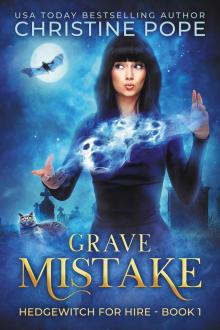 Grave Mistake
Grave Mistake Unbroken Vows
Unbroken Vows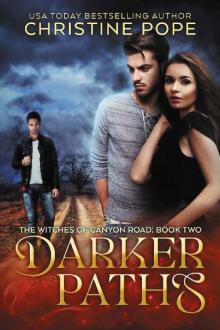 Darker Paths (The Witches of Canyon Road Book 2)
Darker Paths (The Witches of Canyon Road Book 2) The Song of the Thrush
The Song of the Thrush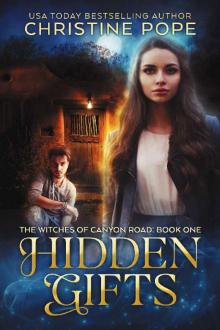 Hidden Gifts (The Witches of Canyon Road Book 1)
Hidden Gifts (The Witches of Canyon Road Book 1) Unholy Ground
Unholy Ground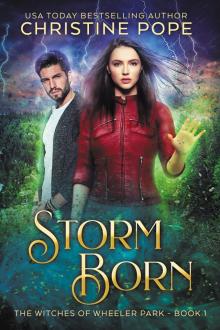 Storm Born
Storm Born Unquiet Souls
Unquiet Souls An Ill Wind
An Ill Wind Demon Born
Demon Born Mysterious Ways
Mysterious Ways Haunted Hearts
Haunted Hearts A Canyon Road Christmas
A Canyon Road Christmas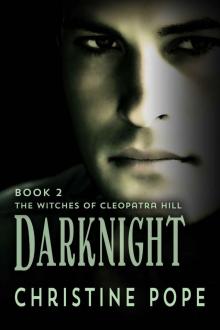 Darknight (The Witches of Cleopatra Hill Book 2)
Darknight (The Witches of Cleopatra Hill Book 2) Threads of Gold (Tales of the Latter Kingdoms Book 6)
Threads of Gold (Tales of the Latter Kingdoms Book 6) The Witches of Canyon Road, Books 1-3
The Witches of Canyon Road, Books 1-3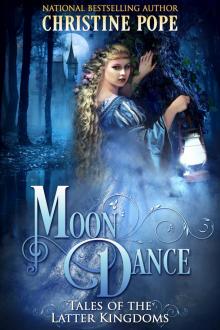 tales of the latter kingdom 08 - moon dance
tales of the latter kingdom 08 - moon dance Stolen and Seduced
Stolen and Seduced Winds of Change
Winds of Change Bad Vibrations: Book 1 of the Sedona Files
Bad Vibrations: Book 1 of the Sedona Files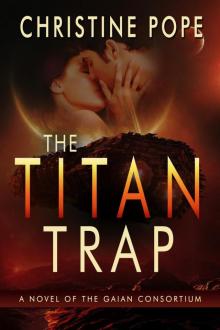 gaian consortium 05 - the titan trap
gaian consortium 05 - the titan trap Unbound Spirits
Unbound Spirits sedona files 05 - falling angels
sedona files 05 - falling angels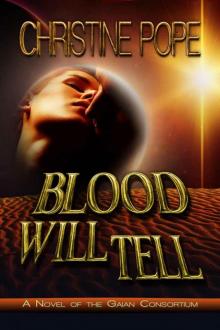 Blood Will Tell
Blood Will Tell Breath of Life
Breath of Life djinn wars 03 - fallen
djinn wars 03 - fallen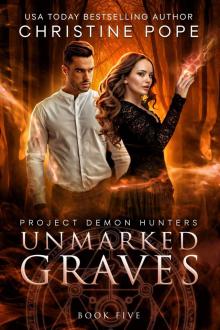 Unmarked Graves
Unmarked Graves All Fall Down
All Fall Down djinn wars 01 - chosen
djinn wars 01 - chosen Defender (The Witches of Cleopatra Hill Book 11)
Defender (The Witches of Cleopatra Hill Book 11) The Wolf of Harrow Hall (Tales of the Latter Kingdoms Book 7)
The Wolf of Harrow Hall (Tales of the Latter Kingdoms Book 7) sedona files - books one to three
sedona files - books one to three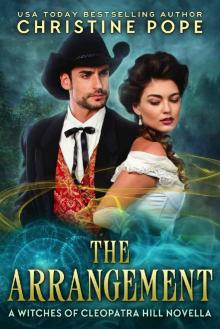 The Arrangement (The Witches of Cleopatra Hill Book 10)
The Arrangement (The Witches of Cleopatra Hill Book 10)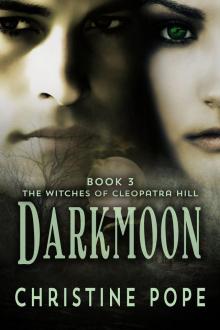 Darkmoon (The Witches of Cleopatra Hill Book 3)
Darkmoon (The Witches of Cleopatra Hill Book 3) Playing With Fire
Playing With Fire djinn wars 02 - taken
djinn wars 02 - taken Falling Dark
Falling Dark witches of cleopatra hill 04.5 - cleopatra hill christmas
witches of cleopatra hill 04.5 - cleopatra hill christmas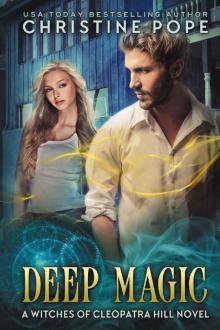 Deep Magic
Deep Magic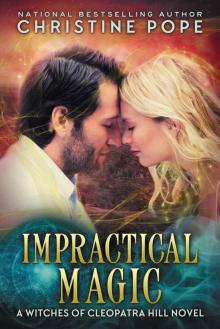 witches of cleopatra hill 07 - impractical magic
witches of cleopatra hill 07 - impractical magic Demons & Djinn: Nine Paranormal Romance and Urban Fantasy Novels Featuring Demons, Djinn, and other Bad Boys of the Underworld
Demons & Djinn: Nine Paranormal Romance and Urban Fantasy Novels Featuring Demons, Djinn, and other Bad Boys of the Underworld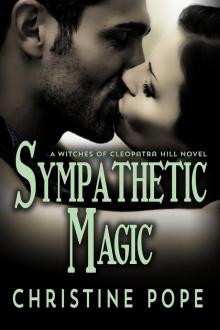 Sympathetic Magic (The Witches of Cleopatra Hill Book 4)
Sympathetic Magic (The Witches of Cleopatra Hill Book 4)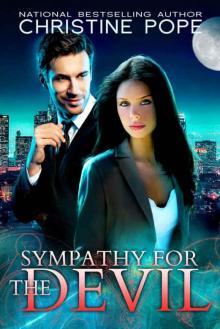 Sympathy for the Devil
Sympathy for the Devil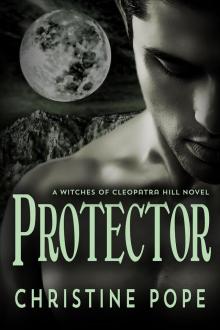 Protector (The Witches of Cleopatra Hill Book 5)
Protector (The Witches of Cleopatra Hill Book 5) Darktide
Darktide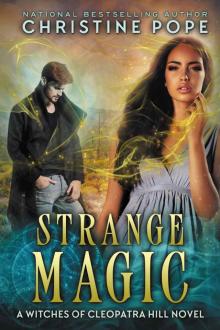 Strange Magic (The Witches of Cleopatra Hill Book 9)
Strange Magic (The Witches of Cleopatra Hill Book 9) Forbidden (The Djinn Wars Book 6)
Forbidden (The Djinn Wars Book 6)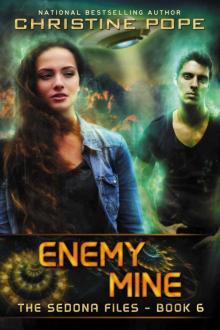 sedona files 06 - enemy mine
sedona files 06 - enemy mine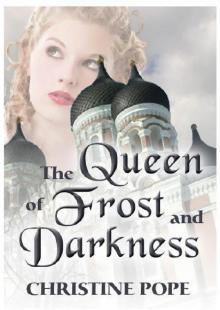 The Queen of Frost and Darkness
The Queen of Frost and Darkness Fringe Benefits
Fringe Benefits Forsaken (The Djinn Wars Book 5)
Forsaken (The Djinn Wars Book 5) Illuminated
Illuminated The Mandala Maneuver
The Mandala Maneuver Deep Magic (The Witches of Cleopatra Hill Book 13)
Deep Magic (The Witches of Cleopatra Hill Book 13) Awoken
Awoken Darkangel (The Witches of Cleopatra Hill)
Darkangel (The Witches of Cleopatra Hill)